
2024 Templeton Prize Winner Pumla Gobodo-Madikizela in Cape Town, South Africa. (Stefan Els, Stellenbosch University)
As a psychologist working for South Africa’s Truth and Reconciliation Commission in the 1990s, Pumla Gobodo-Madikizela was stunned when a handful of widows came forward to forgive their husbands’ murderer, the infamous assassin and police commander Eugene de Kock.
An agent of the apartheid who admitted to more than 100 acts of murder and torture, de Kock’s crimes had earned him the moniker "Prime Evil." The widows’ confounding actions led Gobodo-Madikizela to probe the topic of forgiveness more deeply, eventually leading her to conclude that forgiveness is about desiring and believing in a person’s capacity to transform.
"You are also bringing something into the world, so that something changes," Gobodo-Madikizela said in a video statement. "The death of your loved one births something else."
After decades of research on trauma and forgiveness, Gobodo-Madikizela, a professor at Stellenbosch University in South Africa, was named the winner of the 2024 Templeton Prize on Tuesday (June 4). The award honors individuals who use scientific advancements to answer the deepest questions related to humanity’s existence and purpose.
The prize was established by the late investor and philanthropist Sir John Templeton and comes with an award of 1.1 million British pounds (more than $1.3 million). Gobodo-Madikizela is the second African woman to receive the prize since its launch in 1973, following 2023 winner Edna Adan Ismail.
"As a psychologist, scholar, and commentator, she has served as a guiding light within South Africa as it charts a course beyond apartheid, facilitating dialogue to help people overcome individual and collective trauma," Heather Templeton Dill, president of the John Templeton Foundation, said in a press release. "Her work underscores the importance in contemporary life of cultivating the spiritual values of hope, compassion, and reconciliation."
Advertisement
Gobodo-Madikizela, 69, was born in 1955 in Langa, a township designated for Black residents on the outskirts of Cape Town, South Africa. Though her early years were marked by the brutality of apartheid — she recalls hiding from tanks driving through her town — her parents, who ran a general store, instilled in her values of compassion and integrity at an early age.
Those values informed Gobodo-Madikizela’s work in the 1990s, when she chaired the Human Rights Violations Committee in the Truth and Reconciliation Commission’s Western Cape office. It was in that capacity that she met with de Kock in prison in 1997 to elicit testimony from him.
Over the course of three months, she heard his accounts of the graphic murders he committed and his expressions of remorse. Those now-famous conversations are recounted in Gobodo-Madikizela’s 2003 award-winning book "A Human Being Died That Night," which explores humanity’s capacity for evil, virtue and change, and are immortalized in a play by the same name.
Gobodo-Madikizela’s research on forgiveness and trauma in post-apartheid South Africa culminated in her development of "the reparative quest," a model for social healing.
According to Gobodo-Madikizela, the severing and repair of human relationships is an inherently spiritual process. "When people are traumatized, there is a rupture of the spiritual connection between us as human beings," she said in a video statement. "And so, when conditions are created to repair the rupture, we call on the spiritual, the powerful spiritual connection of humanness to another human — bone of my bone, spirit of my spirit — that beckons us to connect at that level. There’s something about that moment, that has the power of a presence."
Today, Gobodo-Madikizela directs the Center for the Study of the Afterlife of Violence and the Reparative Quest at Stellenbosch University and is a research chair in violent histories and transgenerational trauma for the South African National Research Foundation. She has previously been awarded The Harry Oppenheimer Fellowship Award and Rhodes University’s Social Change Award.







